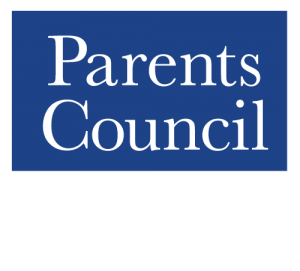Program Summary
The Parents Council of Washington hosted the Student Leader Breakfast on February 8, 2011, at the Georgetown Preparatory School. There were 55 high school juniors and seniors in attendance, representing 28 independent schools. The students participated in an engaging discussion on several issues including school rivalry/school pride, time management, stress, academic integrity, and diversity. Though not all schools approach issues in the same way, the students appreciated hearing the comments of their peers. There were several issues on which students widely agreed, such as the level of stress that students experience. The majority of students in attendance found the Student Leader Breakfast an effective forum for discussing a variety of issues.
The event began with a welcome from Parents Council of Washington Board Member, Shelley Gunner, and was followed later by Jeff Jones, Headmaster of the Georgetown Prep School. The Open Discussion was moderated by Mary Cohen, Parents Council of Washington Board Member and independent school teacher.
Mary Cohen began the program with her opening remarks and she told the student delegates that this is a forum for you, the students, to tell the administrators what you think and what is on your mind, in a totally anonymous manner. She asked the students to please be frank and honest and listen to one another. Lastly, she told them that their comments will be shared with the Deans of our PCW Upper Schools at an upcoming Deans Meeting.
The following Executive Summary is a compilation of notes that were taken by various board members of the Parents Council of Washington during the Student Leader Breakfast. Every effort was made to accurately reflect the statements and opinions of the students, while at the same time not identifying any student by their school affiliation. The morning began with a General Session, which was then followed by four Break-Out Sessions. The program concluded with a Closing Large Group Discussion in which all of the student delegates participated.
The Opening General Session began with a discussion of the challenges of time management given the demanding schedule of most Juniors and Seniors. Students described working on homework and studying for tests late into the night. It can also be difficult to balance schoolwork with the time commitment required to participate in extracurricular activities such as athletics and school organizations. The second topic of discussion was the advantages and disadvantages of rivalries between various independent schools. These rivalries can increase participation and foster school spirit, but can also become negative when they are used to characterize a student or school in an inappropriate way often through social media. This led to conversation about the harmful impact of bullying in Upper Schools and the various programs that schools have implemented to address this important issue. The students noted that there is more verbal bullying than physical bullying and that it mostly occurs online. Web pages such as “Peoples Dirt” allow students to make comments anonymously, which creates incidents of bullying where there is no recourse against the person who actually committed the bullying.
Another interesting topic of discussion was the role of personal electronic devices and online social tools in how students communicate with one another. Texting has become the preferred mode of personal communication. Most students described personal attachments to their cell phones and noted that texting is an integral part of their social interactions with their peers. Facebook also enables students to stay connected with both their fellow students as well as students and friends from other schools. The moderator followed with the more challenging topic of academic integrity and the prevalence of cheating in some Upper School classes. Some schools have established Honor Councils to address incidences of academic dishonesty among the students. The final topic in the large group session was how to achieve a workable balance between a student’s right of free speech and the Administration’s need to create a fair and respectful school environment. Several students described incidences where proposed articles in school publications were censored because they were deemed to be detrimental to the school community. The consensus among the students was that it is very important to develop a good relationship between the students and the Upper School Administration.
The student delegates were then randomly assigned to four Break-Out Sessions for student led small group discussions. Each group was given a list of possible topics for discussion, including diversity, homosexuality, social relationships, stress management, dress codes, and freedoms at school. The conversations were wide ranging and the students did not hesitate to share their ideas and opinions, even on subjects such as sex, drugs and alcohol. A Parents Council of Washington Board member served as a note taker for each group and the summaries of these four Break-Out Sessions are included in the Full Student Leader Breakfast Summary.
All of the student delegates returned to the large group setting for follow-up discussions. The moderator raised the question whether or not a school administration can/should discipline students for activities that occur off campus. Although the students shared differing opinions, they did seem to agree that appropriate actions and punishments would be dependent upon the individual circumstances. In closing the Student Leader Breakfast, Mary Cohen thanked the students for their participation in this annual Parents Council of Washington event and encouraged them to continue these discussions at their schools.


